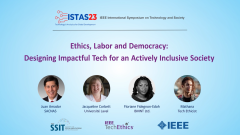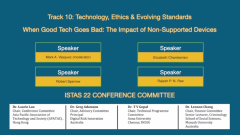The Neuroethics of LAWS from Neural Networks to Robotics and Back Again | LAWS Workshop @ ICRA 2022
About the Video:
Many of the ethical issues in LAWS and robotics turn on topics commonly treated in the ethics of neurotechnology, such as our understanding of the brain and nervous system, prospects for the enhancement of its capacities, and the related ethical, legal and social issues (ELSI). Over the past few years, a global discourse on the neuroethics of LAWS has emerged with a common set of themes. This talk reviews some of those ELSI issues and the global patterns in that discourse.
About the Speaker:
Jonathan D. Moreno is the David and Lyn Silfen University Professor at the University of Pennsylvania, where he is a Penn Integrates Knowledge (PIK) professor. At Penn he is also Professor of Medical Ethics and Health Policy, of History and Sociology of Science, and of Philosophy. His most recent books are Everybody Wants to Go to Heaven but Nobody Wants to Die: Bioethics and the Transformation of Healthcare in America, co-authored with Penn president Amy Gutmann; and The Brain in Context: A Pragmatic Guide to Neuroscience, written with neuroscientist Jay Schulkin. He has published more than a thousand papers, articles, reviews and op-eds. Moreno is senior consultant to a six-year, 10 million euro project on cold war medical science on both sides of the iron curtain, funded by the European Research Council. Moreno’s op eds have been published in venues including The New York Times, The Wall Street Journal, Science, Nature, Slate, Politico, The Hill, Foreign Affairs, Axios.com, The Huffington Post, and Psychology Today. He was co-host of Making the Call, an Endeavor Content podcast and was a columnist for ABCNews.com. Formerly Moreno was a senior fellow at the Center for American Progress in Washington, DC. and editor of the online magazine Science Progress. The American Journal of Bioethics has called him “the quietly most interesting bioethicist of our time.” Moreno is an elected member of the National Academy of Medicine. He has served as staff member or adviser to many governmental and non-governmental organizations, including the UNESCO International Bioethics Committee, three U.S. presidential commissions, the Department of Defense, the Department of Homeland Security, the Department of Health and Human Services, the Centers for Disease Control, the Federal Bureau of Investigation, the Howard Hughes Medical Institute, and the Bill and Melinda Gates Foundation. In 2008-09 he served as a member of President Barack Obama’s transition team.
Recorded at the Workshop on Addressing Ethical and Technical Challenges in the Development, Use and Governance of Lethal Autonomous Weapons Systems during the 2022 IEEE International Conference on Robotics and Automation (ICRA).
Produced in partnership with the IEEE Robotics and Automation Society (https://www.ieee-ras.org/).
Recording funded in part by a grant from the United Engineering Foundation (https://www.uefoundation.org/).
About the Video:
Many of the ethical issues in LAWS and robotics turn on topics commonly treated in the ethics of neurotechnology, such as our understanding of the brain and nervous system, prospects for the enhancement of its capacities, and the related ethical, legal and social issues (ELSI). Over the past few years, a global discourse on the neuroethics of LAWS has...
 Cart
Cart Create Account
Create Account Sign In
Sign In






